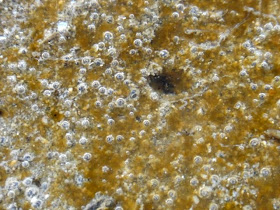
Till now, the crude oil still exists on the shore, creating a top layer of sheen on the water surface. On the sand are many brown patches of slime.

The slime has lots of bubbles! I'm not too sure what does this mean though.

There were 'pancakes' of crude oil on the mid-water mark. At other parts of the shore, the black coloured sand can also be found by scrapping away the top layer. In other words, most part of the shore is polluted. :(
Tanah Merah used to be a fantastic mainland reef and sandy shore before the oil spill. Check my Flickr gallery to see how beautiful it used to be. Many of the southern shores' rare critters can be found on this reclaimed shore, such as nudibranchs, flatworms, large growth forms of corals and lots of special fishes.
Well, how is Tanah Merah now? It is not as fantastic as before but I was amazed that some marine life still hung on tightly!

Despite having polluted waters with a top layer of oil, corals such as this Favid coral (Family Faviidae) still survives.

It was nice to see the Brain coral (Family Mussidae) as well!

Here's a plate-like coral that has a fan worm (Family Sabellidae) on top of it.

At certain stretches of the shore, the most abundant coral species found will be the ever-resistant Zebra coral (Oulastrea crispata). These corals can be found at the toughest of marine conditions, such as the murky waters off our northern shores.

Though coral cover is not as much as in the past, what is heartening will be the numerous juvenile colonies of various species of corals that are growing on the rocks.

While looking at the hard coral, I saw this large Brown-spotted moray (Gymnothorax reevesii). These moray eels were very commonly found at Tanah Merah in the past and I'm glad that we can still see them now after the oil spill.

There were many Haddon's carpet anemones (Stichodactyla haddoni) on the mid-shore zonation. Most were not bleached.

A couple of them even have anemone shrimps (Periclimenes brevicarpalis) as their "companion".

At the further stretches of the shore, there were also some surviving Peacock anemones (Order Ceriantharia).

My heart aches when I see my favourite Common sea stars (Archaster typicus) moving on the oil slicked substrate. Though they look miserable, I was surprised to still see quite a number of them on the shore. Of course there were more of these stars in the past. Nevertheless, these survivors are really tough, don't you think so...?

A couple of probably recently dead Cake sand dollars (Arachnoides placenta) were found on the sandy part. I did not see any living ones though.

This worm-like creature is actually a fish! It is called the Worm eel (Muraenichthys sp.). They swim in S-shapes like snakes and is a very good burrower!

At a certain stretch, I noticed there were about a few of these jellyfishes swimming in the waters. I have never seen them at Tanah Merah before! These are probably Catostylus sp. or Acromitus sp..
Jellyfish swimming in oil slick Tanah Merah from Loh Kok Sheng on Vimeo.
Here's a video of the jellyfish swimming in the oil slicked waters.

Like in the past, there were some Ghost crabs (Ocypode cerathophthalmus) that will scurry away quickly when we draw near to them.

Snails-wise, there were some Black lipped conchs (Strombus urceus).

I was delighted to find a living Spider conch (Lambis lambis)! I've seen them at Tanah Merah before too in the past.

The top find of the day for me was actually not photographed... unfortunately. It is the Spotted hermit crab (Dardanus sp.) that I've never seen before (yes I know it's a bit late and many others have seen before). This hermit crab is really gorgeous in bright orange colour but it was too shy. The fellow retracted into this huge fireband murex shell and refused to come out for me to take photo.
As what Ria says, maybe one day when we see the nudibranchs and flatworms coming back, then Tanah Merah will be closer to it's glorious state in the past, before the oil spill.
More photos of the trip here: http://www.flickr.com/photos/koksheng/archives/date-taken/2010/12/08/
No comments:
Post a Comment